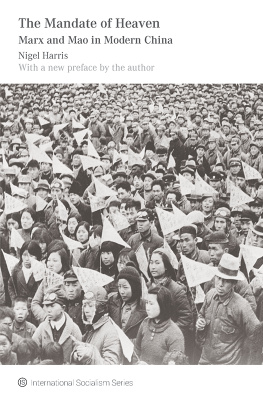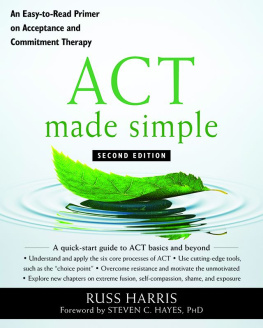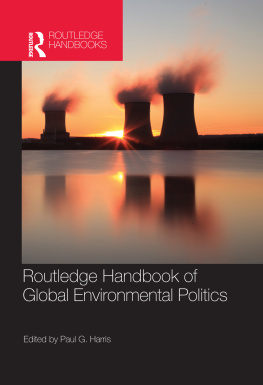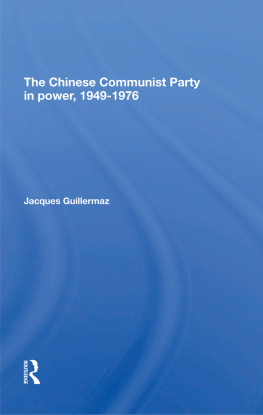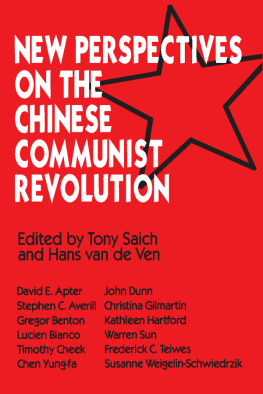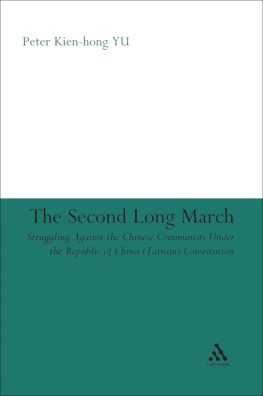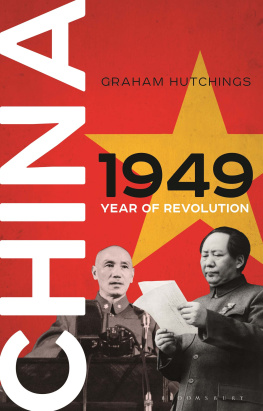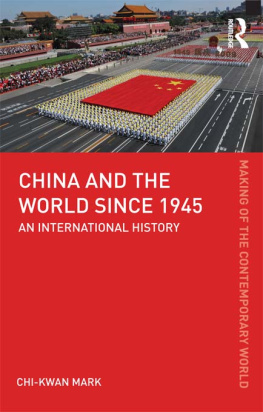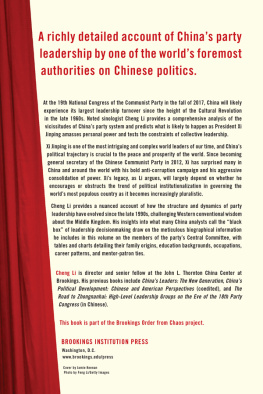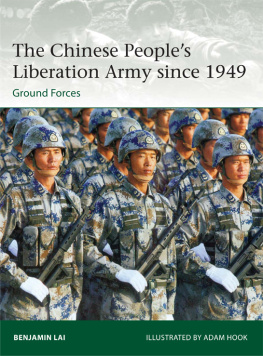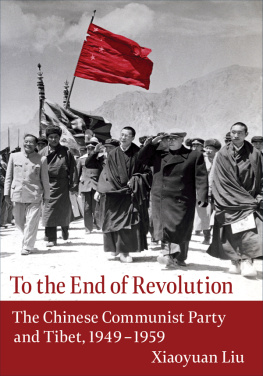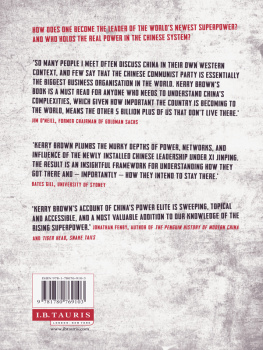Contents
Preface
The Communist party of China claims that it is the leadership of the working class, and that the Chinese working class leads the peasantry in a State which exercises the dictatorship of the proletariat. This book is an appraisal of these claims in the light of present-day reality in China.
The first part is a brief rsum of the partys experience before coming to power in 1949. The second part describes the history of the new Chinese State and the problems it has faced in the period to 1977. Part three then examines the partys relationship to workers and peasants in the Peoples Republic. Part four appraises the degree of equality and democracy in China, and the ability of the new State to protect its hard-won national independence. Part five assesses the significance of Chinas foreign policy and the activities of the supporters of Mao Zedong thought abroad.
Throughout this account, a number of problems arise in relating the claims of the Chinese Communist party to the known record. Part six takes up these themes and attempts to offer an explanation of the past and the present, and so a suggestion as to the future course of events.
I am grateful for the discussions I have had with many people over the issues involved. Particular gratitude is due to Tony Cliff for his work in reading earlier drafts of the manuscript.
London, 1978
Notes for the Reader
Abbreviations Used in the Text and Notes
ACFTU All-China Federation of Trade Unions (before 1953, All-China Federation of Labour)
CB Current Background , translation of official documents of the government or party, issued in translation by the United States Consulate General, Hong Kong
CC Central Committee of the Chinese Communist Party; when it occurs with a number (e.g. the Ninth), this refers to the Congress which elected it
CCP Chinese Communist Party
CI Communist International (Comintern), 1919-43
CQ China Quarterly (originally, Chongqing; from 1960, London)
ECCM Extracts from China Mainland Magazines (subsequently, Extracts from Peoples Republic of China Magazines ), published by the United States Consulate General, Hong Kong
GAC Government Administrative Council; from 1954, State Council, the council of ministers of the Government of the Peoples Republic
RMRB Renmin Ribau ( The Peoples Daily , Beijing)
RMB Renminbau or yuan (or Chinese dollar), official currency of the Peoples Republic.
RB Ribao , daily (of newspapers)
KMT Kuomintang
NPC National Peoples Congress
PLA Peoples Liberation Army
PR Peking Review , Beijing, weekly (in English and other languages)
PRC Peoples Republic of China
SCMP Survey of China Mainland Press (subsequently, Survey of Peoples Republic of China Press ), translations from the Chinese Press, published by the United States Consulate General, Hong Kong. The Hong Kong daily South China Morning Post is also commonly known as the SCMP, but all references in this book are to the Survey of China Mainland Press.
SCMM Survey of China Mainland Magazines (subsequently, Survey of Peoples Republic of China Magazines ), translations from Chinese weekly and monthly publications, published by the United States Consulate General, Hong Kong
SWB Survey of World Broadcasts , monitoring service (of Chinese radio) by the British Broadcasting Corporation, London
Transliteration
The 1978 edition of this book used the Wade-Giles scheme to render most Chinese words into the Western (Roman) alphabet. This edition uses pinyin instead, which was invented on the mainland after the revolution and is now the dominant scheme of romanization. See below for exceptions and explanations.
The Wade-Giles form (or other obsolete form) is used:
For book and periodical titles that themselves used the old romanization;
For authors proper names where the Wade-Giles form is used in the original publication;
In quotations from English-language authors who used Wade-Giles romanization. In such cases, pinyin is sometimes appended in parentheses for clarity;
For proper names where the Chinese themselves still use the old romanization:
Peking Opera;
the Whampoa region and Whampoa Military Academy in Guangdong (pinyin is Huangpu).
For proper names where the Wade-Giles version is well-known, but the pinyin is not:
Confucius (Kongzi in pinyin)
Hong Kong (Xianggang);
Tibet (Xizang)
Sun Yat-sen (Sun Yixian);
Chiang Kai-shek (Jiang Jieshi);
Kuomintang (Guomindang)
Generations of readers are familiar with Kuomintang as the name of the Chinese Nationalist Party of Sun Yat-sen and Chiang Kai-shek. The use of the pinyin version, Guomindang, has gained in currency, but the party itself has retained the Wade-Giles romanization ever since it took over Taiwan following the 1949 Communist victory on the mainland.
In some cases where readers may be familiar with the Wade-Giles form of a name, pinyin is also supplied in parentheses after the names first occurrence. For example, the northeast province ruled by Japan as a puppet state appears as, Manchukuo (Manzhouguo).
Guangzhou replaces Canton, but residents of Guangzhou are called Cantonese.
Chinese measures
RMB: converted from old to new (10,000:1) in 1955. Currently, 1 RMB equals 0.526 US dollars.
Mu: 0.067 hectares or 0.165 acres.
Catty: 500 grammes or 1.102 lbs.
Note on Sources of Maos Works
Statements before 1949
Selected Works of Mao Tse-tung , Vol. 1, Beijing, 1965 (official translation of the second official Chinese edition, Beijing, April 1960). Textual reference: SW I
Mao Tse-tung, Selected Works, 1926-1936 , Vol.1, New York, 1954 (official translation of the Chinese edition, Beijing, 1951). Textual reference: SW I , New York, 1954
Selected Works of Mao Tse-tung , Vols. II and III, Beijing, 1956 (official translation of the second Chinese edition, Beijing, 1960). Textual reference: SW II or SW III
Selected Works of Mao Tse-tung , Vol. IV, Beijing, 1961 (official translation of the first Chinese edition, Beijing, 1960). Textual reference, SW IV
Sources of citation from individual writings of Mao earlier than these editions are cited in the text. They include:
A Documentary History of Chinese Communism , edited by Conrad Brandt, Benjamin Schwartz and John H. Fairbank, New York, 1967. Textual reference: A Documentary History
Maos China: Party Reform Documents, 1942-44 , translated by Boyd Compton, London, 1952
Mao Zedong, China: The March Towards Unity , documents, Communist Party of the United States, New York, 1937
Speeches, writings and quotations after 1949
Official published sourcesfor example, Mao Tse-tung on Art and Literature , Beijing, 1960; Four Essays on Philosophy , Beijing, 1968; Quotations from Chairman Mao Tse-tung , Beijing, 1966; and as cited in the text.
Internal party publications, as compiled in various sources, but particularly Mao Tse-tung ssu-hsiang wan sui ( Long Live Mao Tse-tung Thought ), 1967/69, as translated in:
Miscellany of Mao Tse-tung Thought, 1949-68 , Vols. I and II, Joint Publications Research Service, Arlington Virginia, n.d. (mimeo). Textual reference: Miscellany
Mao Tse-tung Unrehearsed, Talks and Letters, 1965-71 , edited by Stuart R. Schram, London, 1974. Textual reference: Mao Unrehearsed
Mao Papers, Anthology and Bibliography , translated and edited by Jerome Chen, London, 1970. Textual reference: Mao Papers
The publication of Selected Works of Mao Tse-tung , Vol. V, Beijing, 1977 (covering the period 1949 to 1957) occurred too late for the volume to be used here as a source.
For discussions of these documents, cf. the introduction to Schram, op. cit. ; CQ57 , pp.156-65; John Gittings, The World and China, 1922-72 , London, 1974, chs. XI and XII; and CQ60 , pp.750-66; or Roderick McFarquhar, The Times , 5 Sept 1973.
Next page
